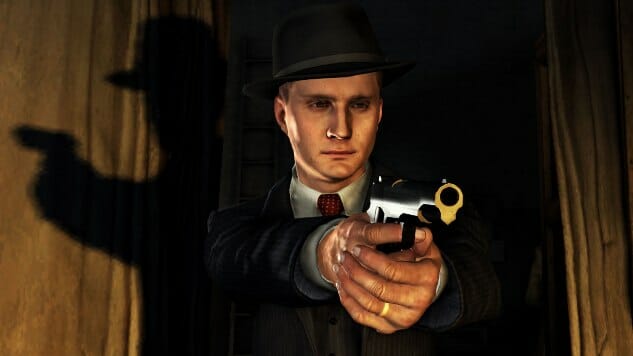This week, for the first time in five years, I dusted off my old copy of L.A. Noire. I never did get around to finishing it 100%, and with a few cases left at four out of five stars, I’d always felt nagged by that lingering sense of incompletion. With my nostalgia shifting into high gear (and many of my friends experiencing L.A. Noire for the first time through this week’s reissue), now seemed a good time to tie up those loose ends, especially as it’s one of my favorite games.
As I played, it occurred to me that while a lot of things have changed, politically and culturally, in the years since L.A. Noire came out, in terms of game genres, much hasn’t. We’re rife with shooters. Trend wise, the craze shifted from MMOs to MOBAs, and now, battle royale type games like PlayerUnknown’s Battlegrounds. But despite the growth of so-called “walking simulators” (about as bad a term as you’ll hear in games) and narrative-driven titles, L.A. Noire hasn’t gone on to inspire many imitators. Where are all the detective games?
There have been some games over the years to use a detective format, but L.A. Noire arguably comes the closest to a true procedural. Most of its peers (except perhaps some Japanese series like Ace Attorney) are point and click affairs that offer only limited interaction between the player and the world around them, inspiring the term “pixel hunters,” among other criticisms. L.A. Noire instead offered the crime scene as a small scale environment where the player would wander and search for clues, but also touch, feel and otherwise interrogate the scenery in a way that made the scenario feel like a true investigation.
Much like Cuphead, the appeal of L.A. Noire lies largely in the game’s ability to recreate the look and feel of a vintage era in entertainment. As with that recently released run and gunner and the Fleischer cartoons that inspired it, L.A. Noire didn’t just touch lightly on its source material, it all but reproduced it whole scale. From the moody, cornet-heavy soundtrack, to the black and white play mode, to the classic detective’s office in the main menu, complete with scattered case files on the desk: heck, even the game’s collectibles (a set of which are movie reel canisters of old noir films) are in on the theme.
It was wise of the game’s designers to harken back to the trope-maker that started it all. Fittingly, they not only used era-appropriate title cards to separate each chapter, but they also adopted a cinematic method of storytelling to flesh out the game’s most important scenes, evoking the feel of a movie. To avoid relying too heavily on this, many key conversations are depicted during scripted driving sequences, achieving a satisfying balance between the two mediums.
For everything it did right, L.A. Noire did have a major flaw, one that left an unpleasant mark on a mechanism key to the game’s premise: a late-stage change to the questioning system that made things more muddled than clear. Originally, when Cole Phelps would interrogate a witness or suspect, three dialogue options popped up, listed as Coax, Force and Accuse. It was later altered to Truth, Doubt or Lie, which made things only marginally better, if at all. With the re-release on Xbox One, PlayStation 4 and Switch, the options are once again changed, this time to Good Cop, Bad Cop and Accuse, which are arguably much closer to the original intent. If the game ever gets a sequel, Rockstar will need to finely tune this one area to truly pull off an interactive neo-Noir.
Looking back, it’s almost astounding that Rockstar took the creative risk they did, embracing an aesthetic now rarely seen outside of Turner Classic Movies. At the time, there was almost no precedent set outside of Grim Fandango, and it was all but guaranteed that the vast majority of their audience had never seen a noir film. But they did it, and six years later that game is still alive and kicking. My hope is that this re-release is a sign that Rockstar is fishing around to see how much interest there would be in a sequel. But my bigger wish is for L.A. Noire to ignite support for a burgeoning detective genre.
Holly Green is the assistant editor of Paste Games and a reporter and semiprofessional photographer. She is also the author of Fry Scores: An Unofficial Guide To Video Game Grub. You can find her work at Gamasutra, Polygon, Unwinnable, and other videogame news publications.